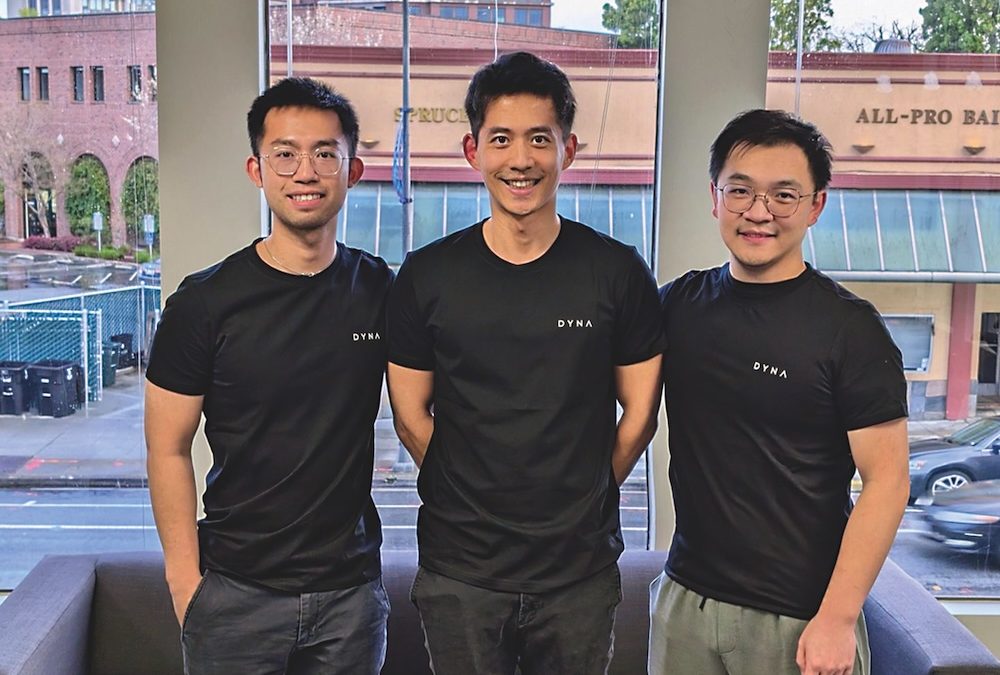Robotics has long been the stuff of science fiction, but increasingly the technology is being leveraged in various manufacturing capacities. Now, it’s being leveraged in the laundromat industry thanks to the work of the team behind Dyna Robotics.
Founded in the fall of 2024 by successful entrepreneurs Lindon Gao, Jason Ma and York Yang. Gao’s previous company, Caper AI sold to Instacart. Now Dyna Robotics is bringing compact, affordable robotics to industries ready for smarter tools — starting with the kinds of repetitive, manual tasks that still rely heavily on human labor.
“Our goal is to make robotics as accessible and intuitive as software,” Gao said. “We’re giving operators the tools to automate repetitive work without needing a full engineering team.”
Dyna aims to help laundromat owners and laundry service providers automate repetitive, labor-intensive tasks — like napkin and towel folding — through intelligent robotic arms built specifically for these environments. “By making automation plug-and-play and affordable, we’re helping laundries operate leaner, smarter, and more profitably,” Gao said.
The robotic arms developed by Dyna are designed specifically for laundry environments. According to the founders, the robotic arms can fold towels, napkins, or linens with consistency and speed, work alongside existing flatwork feeders and folding lines, fit into small back-of-house spaces, all while running at a fraction of the cost of traditional automation systems
They said one of the keys to deploying robotic arms in this manner is to deliver measurable ROI through labor savings and improved throughput. But it goes deeper than ROI. With years of experience deploying intelligent hardware in real-world environments, Gao and his fellow founders are focused on making lives better.
“We started Dyna to bring AI into the physical world in a way that actually makes people’s lives easier,” Gao said. “It’s not about flashy robots — it’s about solving the real, tedious tasks that slow teams down. If we can take one thing off your plate and give your team time back, we’ve done our job.”
The successful entrepreneurs also shared their thoughts with PlanetLaundry on what they are seeing in robotics and AI, as it relates to the laundromat industry.
What is the most pronounced trend you’re currently seeing in your segment of the industry?
In robotics and AI automation, there’s growing demand for practical, task-specific solutions that solve real operational pain — especially in labor-heavy industries like laundry. But most of the market is still focused on large, expensive machines or humanoid systems that aren’t built for small spaces or simple workflows. We see a huge opportunity in creating compact, affordable robots that fit the needs of all laundry operators.
What are you most excited about going forward?
We’re excited to see how quickly small and mid-sized operators are embracing automation. AI-powered robots are no longer just for factories — they’re now viable tools for everyday businesses like laundries. That shift is happening faster than most people realize.
From a business perspective, what are you most concerned about?
The biggest hurdle is mindset. Many operators assume robotics is too expensive or hard to implement. Our challenge is to show them that modern automation can be compact, affordable, and immediately useful — not some futuristic upgrade only big players can afford.
Where do you see your niche of the laundromat industry headed?
We believe robotic automation will become standard equipment, not a novelty. Tasks like folding and sorting will be handled by machines, and humans will supervise, optimize, and scale operations with fewer constraints.
What’s the biggest reason for laundromat owners to be optimistic about the future?
For the first time, technology is leveling the playing field. You can scale your business without scaling your headcount and still deliver better consistency and service — that’s a powerful shift.
What are the keys to successful laundromat ownership today?
Efficiency, adaptability, and smart investments. The best operators are those who embrace tools that allow you to focus on growth and service.












